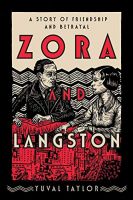From Delancy Place:
 Today’s selection — from Zora and Langston by Yuval Taylor. Zora Neale Hurston started out her career as an anthropologist recording black folklore with the encouragement of Franz Boas, but her real passion was hybrid — a genre that fused fiction and folk, which symbolized “every aspect of daily life”:
Today’s selection — from Zora and Langston by Yuval Taylor. Zora Neale Hurston started out her career as an anthropologist recording black folklore with the encouragement of Franz Boas, but her real passion was hybrid — a genre that fused fiction and folk, which symbolized “every aspect of daily life”:
“Zora had begun studying anthropology under Franz Boas at Columbia in the fall of 1925, which involved a momentous shift of perspective. All her life Zora had been immersed in black folkways and had never even thought of separating her identity from those of the folk. She used to tell this story: when a policeman stopped her from crossing on a red light, she told him that since she saw all the white people crossing on green, she thought the red light was for colored folks. Here, as she often did, she was taking a common black folktale and applying it to herself. Zora defined folklore as ‘the arts of the people before they find out that there is any such thing as art, and they make it out of whatever they find at hand’; as a corollary, the folklore that Zora had always drawn on was suddenly art to her: it had changed its nature.
“Therefore, now that she was embarking on a course of studying the folk, she could no longer be one of them. As she would write at the beginning of Mules and Men, ‘From the earliest rocking of my cradle, I had known about the capers Brer Rabbit is apt to cut and what the Squinch Owl says from the house top. But it was fitting me like a tight chemise. I couldn’t see it for wearing it. It was only when I was off in college, away from my native surroundings, that I could see myself like somebody else and stand off and look at my garment. Then I had to have the spy-glass of Anthropology to look through at that.’ Suddenly African American culture was a thing to research rather than to roll around in and play with.
“In this new endeavor she could not have asked for a better guide than Franz Boas, whom she idolized, calling him ‘the greatest anthropologist alive’ and ‘the king of kings.’ She even convinced Bruce Nugent, who hated schools, to attend Boas’s classes. Boas was sixty-seven at the time and had been at Columbia since 1899. He was without a doubt America’s preeminent anthropologist, almost singlehandedly responsible for debunking scientific racism, defining cultural relativism, and establishing folklore as a subject worthy of scientific study. He unflaggingly encouraged Zora’s work, and urged her to become a professional anthropologist herself; undoubtedly he recognized that Zora could well become America’s foremost authority on black folkways.
More here. (Throughout February, at least one post will be dedicated to honoring Black History Month. The theme this year is: The Family)
